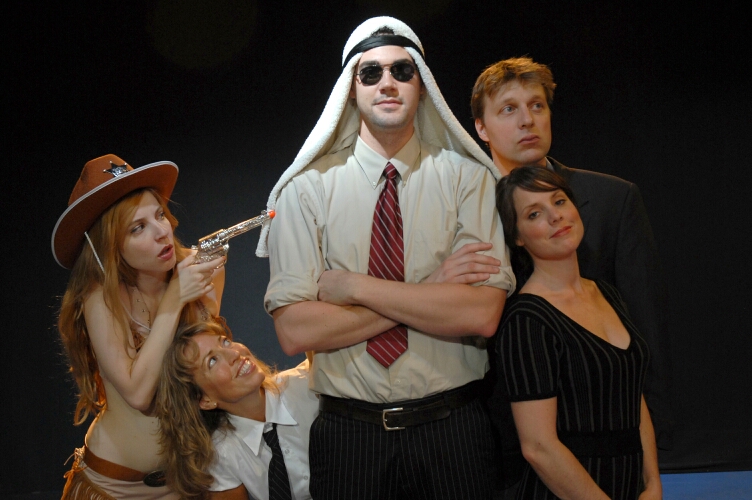
The Sheik
nytheatre.com review by Jo Ann Rosen
The Sheik, a three-act play by Deloss Brown, delivers farce with plenty of tongue-in-cheek. Making its way through Medicine Show's play-development series, this work-in-progress shows both strengths and weaknesses. There are many funny lines, a strong cast, and a clear plot with enough turns to capture and hold an audience.
Act I sets the scene nicely. It is in Act II, where door slamming and split-second timing of entrances and exits usually bring on the laughs, that this farce shows some creaky hinges. The doors are there, but essentially there is very little use of them. The remaining antics weigh the characters down with static buffoonery. Better to reach for the crisp polish and fast pace of, say, Noises Off, and miss slightly, than take the easy road to nowhere. For example, Frank enters the hotel room, giving Joanne an order for champagne-how many times? We got it. It is clear she will get the order wrong. Patsy enters another room. She meanders around a bit with little happening. Then, she makes a few frantic phone calls. Problem is: the play loses momentum.
Part is due to pace. That responsibility falls squarely on the director's shoulders--in this case Brown, who occasionally removes the fourth wall, allowing Jack to expound to the audience that we ought to nuke Iran and then Cuba. He delivers remarks on our current administration that would have more effect in an improvisational setting than they do in this play. Here again, they break the momentum.

Photo by John Quilty
Marc Palmieri does a marvelous job spewing Jack's misogynist and anti-gay proclivities as if he were offering up Wonder Bread to a child. Slouching and pacing, he is a man with a plan, ready to manipulate anyone who crosses his path. Thick-skinned and politically odious, Palmieri gives us a man we love to hate. Lisa Peart plays his love interest, Patsy, with clueless accuracy. Some direction from Brown in Act III might help explain the character's decisive turn on her otherwise aimless path. There is little hint as to what causes her to develop spine. Jack Perry delivers a large presence as Frank, a man manipulated so egregiously that once he assumes the costume of a Sheik he is once again manipulated into the position of a womanizer despite the fact that he is gay--or was he manipulated into that role because he wanted to be an artist? Amber Voiles is the put-upon wife, Marty, who effectively and convincingly functions as a straight man (woman) and then, to her husband's surprise, surrenders everything he has asked for because it suits her. Jacqueline Herbach nicely rounds out the cast as Joanne. Simple sets and lighting for an office and motel were designed by Geoffrey Sherman. He also designed the costumes.